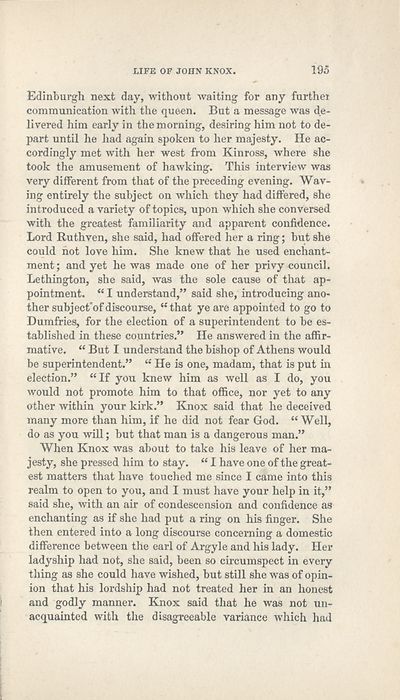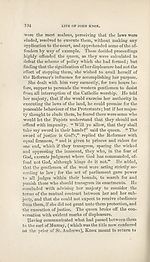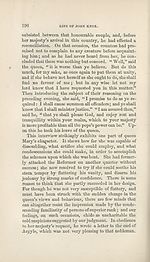Download files
Complete book:
Individual page:
Thumbnail gallery: Grid view | List view

LIFE OF JOHN KNOX.
195
Edinburgh next day, without waiting for any further
communication with the queen. But a message was de¬
livered him early in the morning, desiring him not to de¬
part until he had again spoken to her majesty. He ac¬
cordingly met with her west from Kinross, where she
took the amusement of hawking. This interview was
very different from that of the preceding evening. Wav¬
ing entirely the subject on which they had differed, she
introduced a variety of topics, upon which she conversed
with the greatest familiarity and apparent confidence.
Lord Ruthven, she said, had offered her a ring; but she
could not love him. She knew that he used enchant¬
ment ; and yet he was made one of her privy council.
Lethington, she said, was the sole cause of that ap¬
pointment. “ I understand,” said she, introducing ano¬
ther subject'of discourse, “ that ye are appointed to go to
Dumfries, for the election of a superintendent to be es¬
tablished in these countries.” He answered in the affir¬
mative. “ But I understand the bishop of Athens would
be superintendent.” “ He is one, madam, that is put in
election.” “If you knew him as well as I do, you
would not promote him to that office, nor yet to any
other within your kirk.” Knox said that he deceived
many more than him, if he did not fear God. “ Well,
do as you will; but that man is a dangerous man.”
When Knox was about to take his leave of her ma¬
jesty, she pressed him to stay. “ I have one of the great¬
est matters that have touched me since I came into this
realm to open to you, and I must have your help in it,”
said she, with an air of condescension and confidence as
enchanting as if she had put a ring on his finger. She
then entered into a long discourse concerning a domestic
difference between the earl of Argyle and his lady. Her
ladyship had not, she said, been so circumspect in every
thing as she could have wished, but still she was of opin¬
ion that his lordship had not treated her in an honest
and godly manner. Knox said that he was not un¬
acquainted with the disagreeable variance which had
195
Edinburgh next day, without waiting for any further
communication with the queen. But a message was de¬
livered him early in the morning, desiring him not to de¬
part until he had again spoken to her majesty. He ac¬
cordingly met with her west from Kinross, where she
took the amusement of hawking. This interview was
very different from that of the preceding evening. Wav¬
ing entirely the subject on which they had differed, she
introduced a variety of topics, upon which she conversed
with the greatest familiarity and apparent confidence.
Lord Ruthven, she said, had offered her a ring; but she
could not love him. She knew that he used enchant¬
ment ; and yet he was made one of her privy council.
Lethington, she said, was the sole cause of that ap¬
pointment. “ I understand,” said she, introducing ano¬
ther subject'of discourse, “ that ye are appointed to go to
Dumfries, for the election of a superintendent to be es¬
tablished in these countries.” He answered in the affir¬
mative. “ But I understand the bishop of Athens would
be superintendent.” “ He is one, madam, that is put in
election.” “If you knew him as well as I do, you
would not promote him to that office, nor yet to any
other within your kirk.” Knox said that he deceived
many more than him, if he did not fear God. “ Well,
do as you will; but that man is a dangerous man.”
When Knox was about to take his leave of her ma¬
jesty, she pressed him to stay. “ I have one of the great¬
est matters that have touched me since I came into this
realm to open to you, and I must have your help in it,”
said she, with an air of condescension and confidence as
enchanting as if she had put a ring on his finger. She
then entered into a long discourse concerning a domestic
difference between the earl of Argyle and his lady. Her
ladyship had not, she said, been so circumspect in every
thing as she could have wished, but still she was of opin¬
ion that his lordship had not treated her in an honest
and godly manner. Knox said that he was not un¬
acquainted with the disagreeable variance which had
Set display mode to:
![]() Universal Viewer |
Universal Viewer | ![]() Mirador |
Large image | Transcription
Mirador |
Large image | Transcription
| Antiquarian books of Scotland > Scotland/Scots > Life of John Knox ; and, The life of Alexander Henderson > (213) |
|---|
| Permanent URL | https://digital.nls.uk/131834860 |
|---|
| Description | Thousands of printed books from the Antiquarian Books of Scotland collection which dates from 1641 to the 1980s. The collection consists of 14,800 books which were published in Scotland or have a Scottish connection, e.g. through the author, printer or owner. Subjects covered include sport, education, diseases, adventure, occupations, Jacobites, politics and religion. Among the 29 languages represented are English, Gaelic, Italian, French, Russian and Swedish. |
|---|

